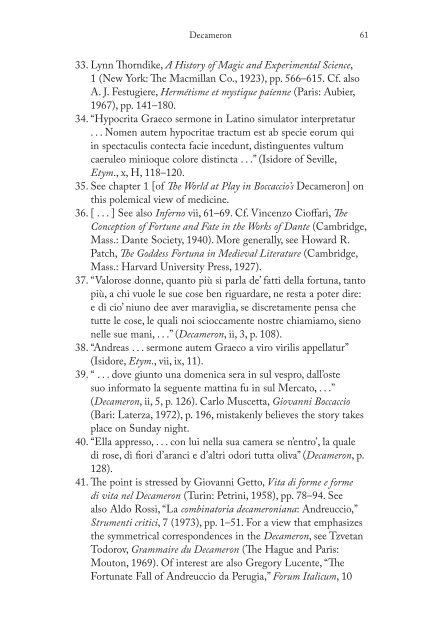Blooms Literary Themes - THE TRICKSTER.pdf - ymerleksi - home
Blooms Literary Themes - THE TRICKSTER.pdf - ymerleksi - home
Blooms Literary Themes - THE TRICKSTER.pdf - ymerleksi - home
Create successful ePaper yourself
Turn your PDF publications into a flip-book with our unique Google optimized e-Paper software.
Decameron 61<br />
33. Lynn Th orndike, A History of Magic and Experimental Science,<br />
1 (New York: Th e Macmillan Co., 1923), pp. 566–615. Cf. also<br />
A. J. Festugiere, Hermétisme et mystique paíenne (Paris: Aubier,<br />
1967), pp. 141–180.<br />
34. “Hypocrita Graeco sermone in Latino simulator interpretatur<br />
. . . Nomen autem hypocritae tractum est ab specie eorum qui<br />
in spectaculis contecta facie incedunt, distinguentes vultum<br />
caeruleo minioque colore distincta . . .” (Isidore of Seville,<br />
Etym., x, H, 118–120.<br />
35. See chapter 1 [of Th e World at Play in Boccaccio’s Decameron] on<br />
this polemical view of medicine.<br />
36. [ . . . ] See also Inferno vii, 61–69. Cf. Vincenzo Cioff ari, Th e<br />
Conception of Fortune and Fate in the Works of Dante (Cambridge,<br />
Mass.: Dante Society, 1940). More generally, see Howard R.<br />
Patch, Th e Goddess Fortuna in Medieval Literature (Cambridge,<br />
Mass.: Harvard University Press, 1927).<br />
37. “Valorose donne, quanto più si parla de’ fatti della fortuna, tanto<br />
più, a chi vuole le sue cose ben riguardare, ne resta a poter dire:<br />
e di cio’ niuno dee aver maraviglia, se discretamente pensa che<br />
tutte le cose, le quali noi scioccamente nostre chiamiamo, sieno<br />
nelle sue mani, . . .” (Decameron, ii, 3, p. 108).<br />
38. “Andreas . . . sermone autem Graeco a viro virilis appellatur”<br />
(Isidore, Etym., vii, ix, 11).<br />
39. “ . . . dove giunto una domenica sera in sul vespro, dall’oste<br />
suo informato la seguente mattina fu in sul Mercato, . . .”<br />
(Decameron, ii, 5, p. 126). Carlo Muscetta, Giovanni Boccaccio<br />
(Bari: Laterza, 1972), p. 196, mistakenly believes the story takes<br />
place on Sunday night.<br />
40. “Ella appresso, . . . con lui nella sua camera se n’entro’, la quale<br />
di rose, di fi ori d’aranci e d’altri odori tutta oliva” (Decameron, p.<br />
128).<br />
41. Th e point is stressed by Giovanni Getto, Vita di forme e forme<br />
di vita nel Decameron (Turin: Petrini, 1958), pp. 78–94. See<br />
also Aldo Rossi, “La combinatoria decameroniana: Andreuccio,”<br />
Strumenti critici, 7 (1973), pp. 1–51. For a view that emphasizes<br />
the symmetrical correspondences in the Decameron, see Tzvetan<br />
Todorov, Grammaire du Decameron (Th e Hague and Paris:<br />
Mouton, 1969). Of interest are also Gregory Lucente, “Th e<br />
Fortunate Fall of Andreuccio da Perugia,” Forum Italicum, 10

















